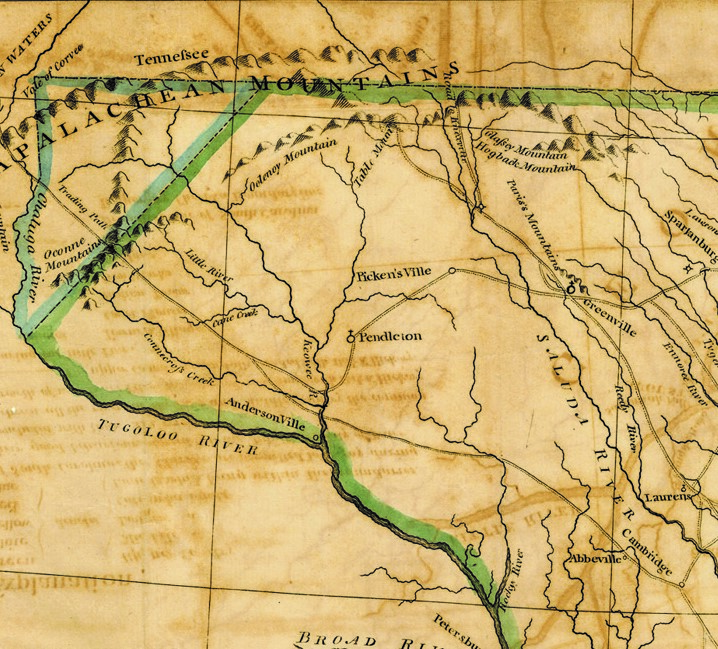
Top portion of Thomas Coram’s 1802 Map of South Carolina. The legend states that the area outlined in blue demarks: “Lands, which being within the Boundaries of South Carolina, the Cherokee are permitted to enjoy during their good behaviour, agreeable to the difinitive [sic] Treaty of Peace concluded with them A.D. 1777.” Courtesy of the South Carolina Historical Society
On May 20, 1777, delegates from the Lower Towns of the Cherokee Nation and officials from South Carolina and Georgia met at DeWitt’s Corner, a colonial trading post in what is now Ninety-Six. The meeting culminated with the signing of a treaty that ended the Second Cherokee War. The victorious Americans separated South Carolina from Cherokee lands with a boundary that ran along the crest of Oconee Mountain. By signing the treaty, the Cherokees relinquished almost all their lands in South Carolina, including what is now Anderson, Greenville, Oconee, and Pickens counties.
The Second Cherokee War began in 1776, when the British provoked the Cherokees to raid the farms and homes of American Patriots on the frontier. In July, the Cherokees attacked settlements in Ninety-Six and the Spartan District and killed several individuals. Andrew Williamson, Francis Salvador, and Andrew Pickens led Patriot troops against the Native Americans and Loyalists. In early August, Alexander Cameron commanded a combined force of 1,200 Loyalists and Cherokees that ambushed Williamson’s troops at Seneca Old Town. The Patriots were originally driven back, but Andrew Pickens arrived in time to force Cameron to retreat. Following that encounter, the Patriots burned every Cherokee town and field they found. Later in August, Pickens and twenty-five men were surprised by Cherokees in what is now Oconee County. A brutal hand-to-hand battle occurred, which left eleven dead from Pickens’ troops and over sixty Cherokee warriors killed.
As the fall approached, the Cherokees’ strength was dissipated. They had lost nearly two thousand people and it was obvious that they could not continue the battle. The following spring, they agreed to meet with Patriot leaders. South Carolina sent Colonel Williamson, Leroy Hammond, William Henry Drayton, and Daniel Horry to DeWitt’s Corner. In addition to the cessation of land, the treaty stipulated that any white person who instigated or encouraged the Cherokee War should be handed over to the Patriots. The significance of the treaty is twofold: it ended the Cherokee’s claim to most of their land in South Carolina and it destroyed Britain’s hopes for an alliance with Native Americans in the area.